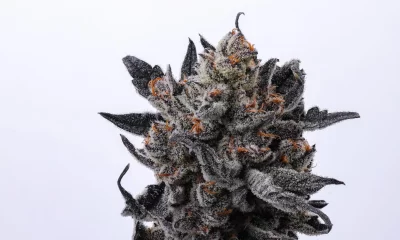Government
Draft Rules Published for U.S. Virgin Islands Medical Cannabis Program

Eight years after voters approved medical cannabis, the U.S. Virgin Islands is getting closer to launching its medical weed program.
On Aug. 10, the V.I. Cannabis Advisory Board (VICAB) in the U.S. Virgin Islands unanimously approved draft regulations for its medical cannabis program. On Aug. 12, the Office of Cannabis Regulations posted the draft publicly, and it will remain online for a 30-day public comment window that ends on Sept. 11. In addition to this, a meeting is set to be held in person on Aug. 31 as well.
According to the current draft, licenses will soon become available over the next three months, with cultivation licenses beginning on Oct. 3, research and development licenses on Oct. 26, manufacturing licenses on Dec. 5, and finally dispensary licenses on Dec. 27. Laboratory services request proposals will also open up on Oct. 12, with physician registration on Nov. 3, and patient registration on Dec. 14. All of the licenses will be open for 30 days after the start date, and once reviewed and scored, the results of any applicants that reach a score of 80% or more will be posted publicly.
Competition is fierce though, as the St. Thomas district is allowed to have eight level-one cultivation licenses, St. John will allow four, and St. Croix will allow one. However, this could be subject to change, as Executive Director Hannah Carty shared in March that “the exact number of licenses to be released on an annual basis will be determined by the Cannabis Advisory Board. They shall not release licenses that supersede the amounts allowed by 19 V.I. Code; Chapter 34,” Carty said.
VICAB was seeking to adopt a lottery system among qualifying license applicants, but V.I. Department of Licensing and Consumer Affairs Commissioner Richard Evangelista, among others, opposed the idea. “The lottery system seems like it’s a duplicative effort and I don’t think it should be a lottery, I think it should be based on merit, as long as we have a valid, fair scoresheet,” said Evangelista. “I think it should be based on merit, not merit and a lottery.” The rules were amended to use a lottery only in the event of a tie.
The VICAB is operating on a one-time loan of $500,000 from the Office of Management & Budget. After two years, the department must fully fund itself through the fees it collects.
According to Agriculture Commissioner Positive Nelson, the timeline requires swift action. “The longer it takes to start the program, the longer it’s gonna take to generate the revenue to sustain itself, so that’s part of the hiccup right there, and we may have to ask for additional time from the Legislature if we don’t get to start up real soon,” Nelson said.
In response, Chairman Dr. Catherine Kean shared a message for viewers to provide insight into why the program has taken such a long time to put together. “I think we want the general public to realize that we never anticipated it taking this long to roll out,” said Kean. “All of the obstacles we encountered along the way, whether they were real obstacles or perceived to be obstacles…the last three years have been very trying. So, the $500,000 that we have been willing to pay back, I guess we have been whittling away at that to some degree. We’re just trying to really move forward. Once we get the rules and regulations out there, and utilizing this strategic plan, I think we can try and turn the corner so we can actually start to accrue some funding back once we get the licenses out.”
Voters in the Virgin Islands approved medical cannabis in 2014; legislators passed the Medical Cannabis Patient Care Act in 2018; and Gov. Albert Bryan signed the act into law in 2019. The VICAB held its first meeting in January 2020, and now two years later, the U.S. Virgin Islands is moving one step closer to the implementation of its program.
According to the St. Thomas Source, the program rules were supposed to be developed within 120 days of the act being signed by Gov. Bryan, but there was a delay when a new executive director was being sought out. Eventually, Hannah Carty was appointed the position in September 2021.
“Essentially this person is going to be, a play on words, the cultivator of the cannabis advisory board,” said Evangelista in September. “They are now tasked with running the Office of Cannabis Regulation. They are going to be our liaison to the actual office that is going to be charged with this; we just have oversight responsibility. They are going to be tasked with making sure the rules and regulations are being published, public comment is permitted and that is why it was integral to the process that we get a director on board.”
Source: https://hightimes.com/news/draft-rules-published-for-u-s-virgin-islands-medical-cannabis-program/
Business
New Mexico cannabis operator fined, loses license for alleged BioTrack fraud

New Mexico regulators fined a cannabis operator nearly $300,000 and revoked its license after the company allegedly created fake reports in the state’s traceability software.
The New Mexico Cannabis Control Division (CCD) accused marijuana manufacturer and retailer Golden Roots of 11 violations, according to Albuquerque Business First.
Golden Roots operates the The Cannabis Revolution Dispensary.
The majority of the violations are related to the Albuquerque company’s improper use of BioTrack, which has been New Mexico’s track-and-trace vendor since 2015.
The CCD alleges Golden Roots reported marijuana production only two months after it had received its vertically integrated license, according to Albuquerque Business First.
Because cannabis takes longer than two months to be cultivated, the CCD was suspicious of the report.
After inspecting the company’s premises, the CCD alleged Golden Roots reported cultivation, transportation and sales in BioTrack but wasn’t able to provide officers who inspected the site evidence that the operator was cultivating cannabis.
In April, the CCD revoked Golden Roots’ license and issued a $10,000 fine, according to the news outlet.
The company requested a hearing, which the regulator scheduled for Sept. 1.
At the hearing, the CCD testified that the company’s dried-cannabis weights in BioTrack were suspicious because they didn’t seem to accurately reflect how much weight marijuana loses as it dries.
Company employees also poorly accounted for why they were making adjustments in the system of up to 24 pounds of cannabis, making comments such as “bad” or “mistake” in the software, Albuquerque Business First reported.
Golden Roots was fined $298,972.05 – the amount regulators allege the company made selling products that weren’t properly accounted for in BioTrack.
The CCD has been cracking down on cannabis operators accused of selling products procured from out-of-state or not grown legally:
- Regulators alleged in August that Albuquerque dispensary Sawmill Sweet Leaf sold out-of-state products and didn’t have a license for extraction.
- Paradise Exotics Distro lost its license in July after regulators alleged the company sold products made in California.
Golden Roots was the first alleged rulebreaker in New Mexico to be asked to pay a large fine.
Source: https://mjbizdaily.com/new-mexico-cannabis-operator-fined-loses-license-for-alleged-biotrack-fraud/
Business
Marijuana companies suing US attorney general in federal prohibition challenge

Four marijuana companies, including a multistate operator, have filed a lawsuit against U.S. Attorney General Merrick Garland in which they allege the federal MJ prohibition under the Controlled Substances Act is no longer constitutional.
According to the complaint, filed Thursday in U.S. District Court in Massachusetts, retailer Canna Provisions, Treevit delivery service CEO Gyasi Sellers, cultivator Wiseacre Farm and MSO Verano Holdings Corp. are all harmed by “the federal government’s unconstitutional ban on cultivating, manufacturing, distributing, or possessing intrastate marijuana.”
Verano is headquartered in Chicago but has operations in Massachusetts; the other three operators are based in Massachusetts.
The lawsuit seeks a ruling that the “Controlled Substances Act is unconstitutional as applied to the intrastate cultivation, manufacture, possession, and distribution of marijuana pursuant to state law.”
The companies want the case to go before the U.S. Supreme Court.
They hired prominent law firm Boies Schiller Flexner to represent them.
The New York-based firm’s principal is David Boies, whose former clients include Microsoft, former presidential candidate Al Gore and Elizabeth Holmes’ disgraced startup Theranos.
Similar challenges to the federal Controlled Substances Act (CSA) have failed.
One such challenge led to a landmark Supreme Court decision in 2005.
In Gonzalez vs. Raich, the highest court in the United States ruled in a 6-3 decision that the commerce clause of the U.S. Constitution gave Congress the power to outlaw marijuana federally, even though state laws allow the cultivation and sale of cannabis.
In the 18 years since that ruling, 23 states and the District of Columbia have legalized adult-use marijuana and the federal government has allowed a multibillion-dollar cannabis industry to thrive.
Since both Congress and the U.S. Department of Justice, currently headed by Garland, have declined to intervene in state-licensed marijuana markets, the key facts that led to the Supreme Court’s 2005 ruling “no longer apply,” Boies said in a statement Thursday.
“The Supreme Court has since made clear that the federal government lacks the authority to regulate purely intrastate commerce,” Boies said.
“Moreover, the facts on which those precedents are based are no longer true.”
Verano President Darren Weiss said in a statement the company is “prepared to bring this case all the way to the Supreme Court in order to align federal law with how Congress has acted for years.”
While the Biden administration’s push to reschedule marijuana would help solve marijuana operators’ federal tax woes, neither rescheduling nor modest Congressional reforms such as the SAFER Banking Act “solve the fundamental issue,” Weiss added.
“The application of the CSA to lawful state-run cannabis business is an unconstitutional overreach on state sovereignty that has led to decades of harm, failed businesses, lost jobs, and unsafe working conditions.”
Business
Alabama to make another attempt Dec. 1 to award medical cannabis licenses

Alabama regulators are targeting Dec. 1 to award the first batch of medical cannabis business licenses after the agency’s first two attempts were scrapped because of scoring errors and litigation.
The first licenses will be awarded to individual cultivators, delivery providers, processors, dispensaries and state testing labs, according to the Alabama Medical Cannabis Commission (AMCC).
Then, on Dec. 12, the AMCC will award licenses for vertically integrated operations, a designation set primarily for multistate operators.
Licenses are expected to be handed out 28 days after they have been awarded, so MMJ production could begin in early January, according to the Alabama Daily News.
That means MMJ products could be available for patients around early March, an AMCC spokesperson told the media outlet.
Regulators initially awarded 21 business licenses in June, only to void them after applicants alleged inconsistencies with how the applications were scored.
Then, in August, the state awarded 24 different licenses – 19 went to June recipients – only to reverse themselves again and scratch those licenses after spurned applicants filed lawsuits.
A state judge dismissed a lawsuit filed by Chicago-based MSO Verano Holdings Corp., but another lawsuit is pending.
Source: https://mjbizdaily.com/alabama-plans-to-award-medical-cannabis-licenses-dec-1/
-

 Business2 years ago
Business2 years agoPot Odor Does Not Justify Probable Cause for Vehicle Searches, Minnesota Court Affirms
-

 Business2 years ago
Business2 years agoNew Mexico cannabis operator fined, loses license for alleged BioTrack fraud
-

 Business2 years ago
Business2 years agoAlabama to make another attempt Dec. 1 to award medical cannabis licenses
-

 Business2 years ago
Business2 years agoWashington State Pays Out $9.4 Million in Refunds Relating to Drug Convictions
-

 Business2 years ago
Business2 years agoMarijuana companies suing US attorney general in federal prohibition challenge
-

 Business2 years ago
Business2 years agoLegal Marijuana Handed A Nothing Burger From NY State
-

 Business2 years ago
Business2 years agoCan Cannabis Help Seasonal Depression
-

 Blogs2 years ago
Blogs2 years agoCannabis Art Is Flourishing On Etsy













